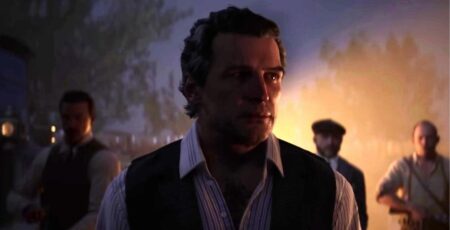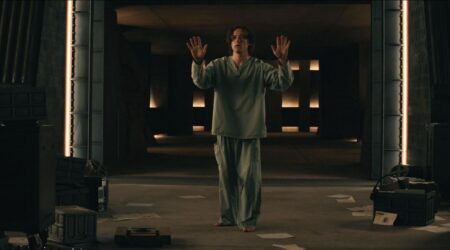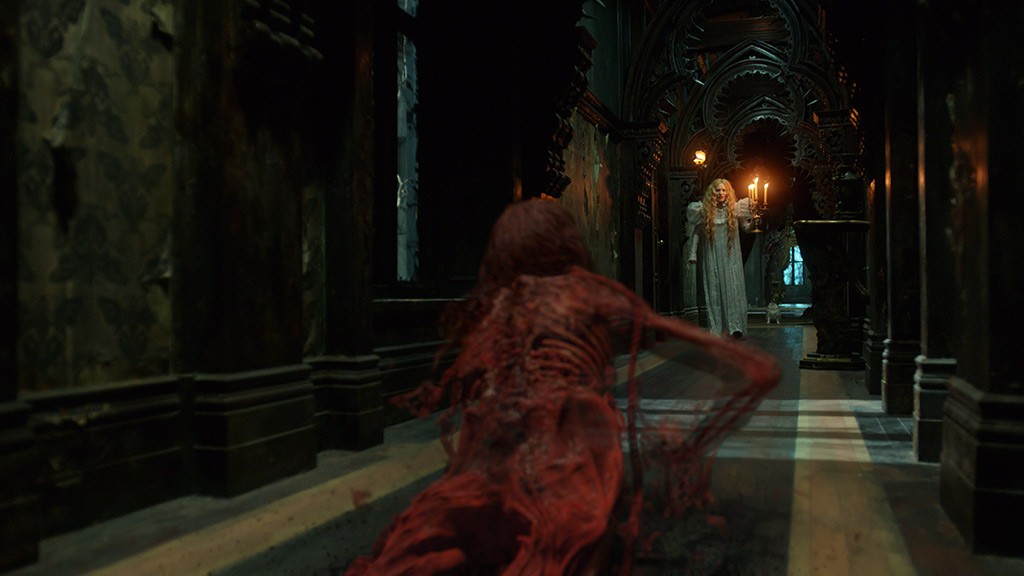
In the early days of horror, the genre was about building suspense and dread by building a connection between the audience and the protagonist. For me, the beauty of horror is having a mirror held up to you, so much so, that a thread is tied around your heart to the main characters. You feel what they feel. What is unique to Guillermo del Toro’s horror is that the thread is not just attached to a single character or trope, to someone who looks like you but is multifaceted and connects you to the heroes, the atmosphere, and above all else the monsters. When Universal was giving us monsters, they showed us their violence, but they also showed us their humanity. Given del Toro ‘s childhood love of monsters, which fuels his directing career, it’s no surprise that this is the heart of his stories.
If you’re not familiar with the current state of horror, those in wide circulation are heavily based on jump scares and variations of visual gags and gore. It’s been this way for some time and although we are seeing a shift in the landscape with beautiful and empathetic films like Jordan Peele’s GET OUT, this is usually left to limited releases and the festival circuits. In most wide-release Hollywood horror films, we’re seeing jump after jump with little emotion building beyond the need for you to root for good to prevail. Del Toro has been able to give his monsters a soul and turn our assumptions of them on their head.
This is only possible through del Toro’s unique relationship with, and understanding of, monsters. To del Toro, “monsters are the patron saints of the imperfection” and beyond that, they aren’t there to scare, but instead they vehicles for imperfection to be accepted and valued. Although his monsters sometimes reveal themselves to be leading our hero in the wrong direction, more often than not they are there to save them, or at the very least show them how to save themselves. This is the case in Crimson Peak (2015).
A Gothic horror romance heavily influenced by some of del Toro’s favorite novels (like Wuthering Heights), we see a romantic ghost story. In it, the ghost is grotesque and visually opposite of our main protagonist, Edith (Mia Wasikowska), in her pristine white gown (pictured above). Although it makes its appearance in a way that scares our protagonist and the audience, it is revealed that it is, in fact, a woman, warning Edith of her impending doom. Instead of using the ghost to only scare us, del Toro uses her to as an important piece of the story that pulls the viewer and our protagonist through the twist and turns of character relationships and Edith’s transition from ignorance to discovery. In the end, we see the ghost’s motive, her pain, and we feel for her, even in her decrepit state.
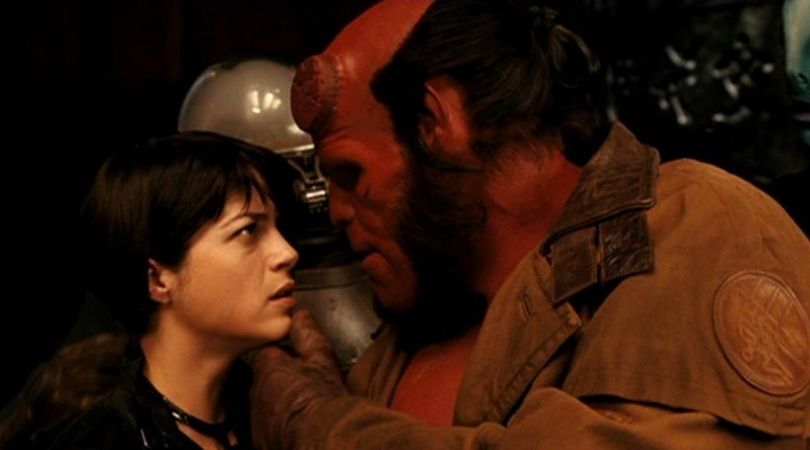
In Hellboy II: The Golden Army (2008), we’re shown monsters in multiple forms. From single-minded tooth fairies who feed on bone, an Elf prince set on bringing his hidden people to the surface once more, to a kaiju-like earth giant who is the last of it’s kind and ultimately our main characters: Hellboy (Ron Perlman) and Liz (Selma Blair). Each of whom is monstrous in their own ways. All of the creatures in this film have their own circumstances, motives, and are not there to serve only as a creature to root against, but as a mirror to see ourselves in, as Hellboy does. In his interaction with the Earth Giant, he learns that they are both the last of their kind, and must make the decision to kill it or let it wreak havoc. And in his fights with the prince, we see two royal sons, fighting to protect their respective worlds. But in the streets, among the people, we see Hellboy as an irredeemable monster.
When it comes to the romance, del Toro brought Liz from side character to a leader who sees herself as a monster, even though her difference is hidden from view. Where Hellboy is feared because of his devilish looks, even after rescuing a baby, Liz sees him as a human, sometimes more human than herself. When Hellboy is being threatened by an ungrateful and scared crowd, Liz steps forward and reveals her monstrous powers after being told to step away from him.
With her, del Toro takes how society constructs monsters, and largely how the audience thinks of them, and shows us the truth. As a monster who is visually a part of two worlds, she must come to accept Hellboy’s imperfections to ultimately save his life, and start their own. It’s easy to detach our heroes from their monstrous nature, but that isn’t del Toro’s intention. It is, in fact, ground them in it, for them to accept it and grow. With Liz and Hellboy ending the movie to start a family, he shows their humanity, their love, and ultimately a new definition of a monster.
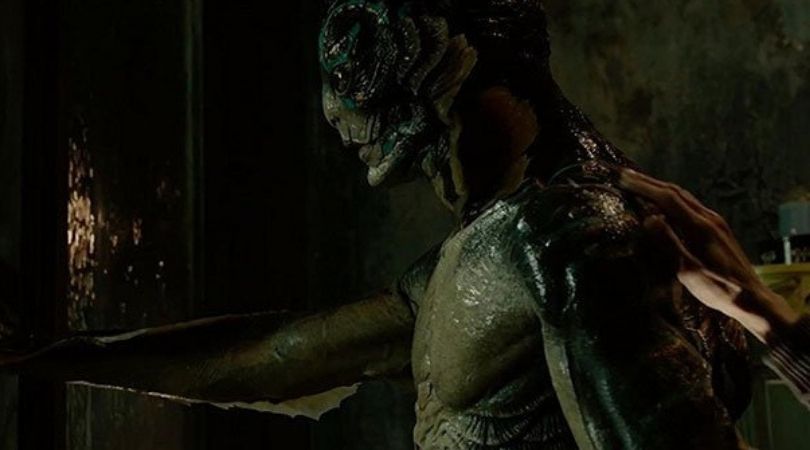
This brings us to The Shape of Water (2017). As del Toro’s most recent work and one that contains 25 years of work, it is rooted in his deep love of the Creature from the Black Lagoon (1954) and the need to have a fairy tale for troubled times. In recent interviews, del Toro has explained that his monster romance is not from a place of horror, but like most of his works, a place of fable. To him, it chronicles the treatment of difference and the fear and hatred of the other. He points out that as an immigrant, he still feels a thick air of hatred and that is why he desperately needed a tale of love through acceptance.
Much like Liz learns that she shouldn’t aim to change Hellboy, the couple in this film – Elisa (Sally Hawkins) and The Asset (Doug Jones) – meet and see no difference in each other. He is an Amazonian god and she is a mute member of the cleaning staff, but to them, they are one in the same. For the viewer, we are to see ourselves in the creature as much as the leading lady. As The Asset is tortured and almost killed, it’s her attempt to rescue him that is a vehicle to save herself and those who revolve her. Even when The Asset reveals his monstrous nature by eating Elisa’s neighbor’s cat, the cat’s owner doesn’t blame him.
He sees it as The Asset’s way of being and tells Elisa, and us, that we can’t expect him to do something other than he is. The real monster in this story is not the visual monster, but rather the man trying to tear them apart. The government worker, Richard Strickland (Michael Shannon). A man who is set out to succeed at all costs, it is his spiral into disrepair that is fueled by his sense of superiority, which brings about his downfall. Through his racist remarks, sexual harassment, and need to succeed, it is his inability to accept difference that is the catalyst to his destruction by the hands of The Asset.
Horror isn’t just about scaring someone. It’s a genre with which the director uses film to highlight the biggest fears of our culture. With del Toro, he does something entirely different. He shows us our fears, but even in his bleakest of stories, he layers the tale with our hopes. These hopes are more easily embodied by an imperfect creature, whose flaws are there by design and not by choice. In them we are given pieces of the monster’s soul to identify with, to be moved by, just as much as we are to be taken by his heroes. His monsters are saints of imperfections and once those imperfections are accepted, they show us the cosmology he has created within them and for his protagonists, they show them how to end the story. It is through monsters that del Toro weaves his fairy tales, making them essential for more than scares. He shows us their violence, their, pain, and their humanity all in one stroke. Great horror is as emotive and empathetic as it is dark.


